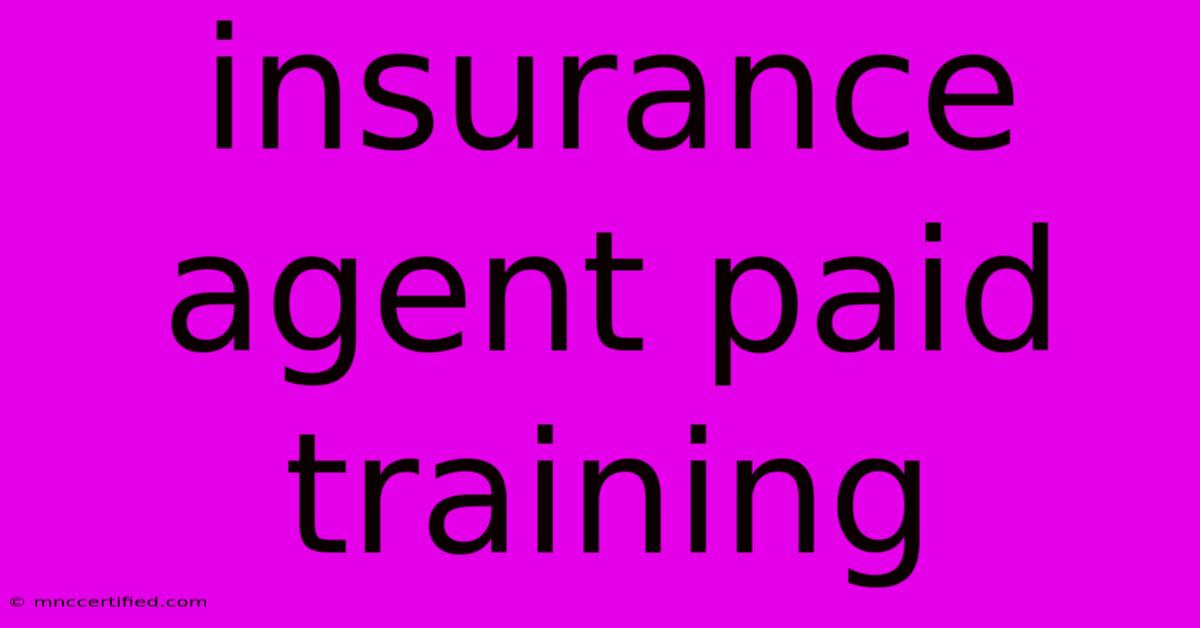Insurance Agent Paid Training

Table of Contents
Insurance Agent Paid Training: Launch Your Career the Right Way
So, you're considering a career in insurance? Smart move! The industry offers stability, excellent earning potential, and the rewarding feeling of helping people protect their futures. But before you dive in, you might be wondering: is there paid insurance agent training? The answer is a resounding yes, and this comprehensive guide will explore the various avenues available. We'll cover everything from entry-level programs to advanced certifications, helping you find the perfect paid training path to launch your successful insurance career.
Types of Paid Insurance Agent Training Programs
The insurance industry offers a range of paid training opportunities, depending on the company and the specific license you're pursuing. These typically fall into a few categories:
1. Company-Sponsored Training Programs:
Many large insurance companies offer extensive paid training programs for new agents. These programs often combine classroom instruction with on-the-job experience, providing a comprehensive introduction to the industry. Benefits include:
- Structured Learning: A clear curriculum covering sales techniques, product knowledge, and compliance regulations.
- Mentorship: Guidance from experienced agents who can provide valuable support and advice.
- Salary & Benefits: While the exact compensation varies, many programs offer a salary or stipend during the training period, along with health insurance and other benefits.
- Guaranteed Leads: Some companies provide new agents with pre-qualified leads, helping them build their client base faster.
Finding these opportunities requires proactive research. Check the career pages of major insurance companies like State Farm, Allstate, Nationwide, and Farmers Insurance. Look for keywords like "agent training program," "paid internship," or "entry-level sales."
2. Apprenticeships and Internships:
While not always explicitly labeled as "paid training," many insurance agencies offer apprenticeships or internships that provide valuable experience and compensation. These opportunities often focus on specific areas like underwriting, claims processing, or sales. Advantages include:
- Real-World Experience: Hands-on learning in a professional environment.
- Networking Opportunities: Building connections within the industry.
- Potential for Full-Time Employment: Many apprenticeships lead to full-time positions after completion.
Search for these opportunities on job boards like Indeed, LinkedIn, and Glassdoor. Use keywords like "insurance apprenticeship," "insurance internship," and "insurance trainee."
3. Continuing Education Courses with Stipends:
Once you've obtained your license, ongoing professional development is crucial. Some companies offer stipends or reimbursements for continuing education courses, helping you stay updated on industry changes and enhance your expertise. These courses cover topics like advanced sales strategies, new product offerings, and compliance updates.
Finding Paid Insurance Agent Training: A Step-by-Step Guide
-
Identify Your Target Area: Determine the type of insurance you want to sell (life, health, property & casualty, etc.). This will help you focus your search on relevant training programs.
-
Research Insurance Companies: Visit the career pages of large insurance companies and smaller independent agencies. Look for specific training programs and internship opportunities.
-
Network: Attend industry events, join professional organizations, and connect with insurance professionals on LinkedIn to learn about potential opportunities.
-
Tailor Your Resume and Cover Letter: Highlight any relevant experience and skills, emphasizing your enthusiasm for the industry and your commitment to continuous learning.
-
Prepare for Interviews: Practice answering common interview questions related to sales, customer service, and your understanding of the insurance industry.
Beyond Paid Training: Essential Considerations
While paid training is a significant advantage, remember these factors:
- Licensing Requirements: You'll need to obtain the necessary insurance licenses in your state. Research the licensing process and associated costs.
- Continuing Education: Regular continuing education is mandatory to maintain your license.
- Sales Skills: Success in insurance sales requires strong communication, interpersonal, and problem-solving skills.
Finding paid insurance agent training can be the key to a successful and fulfilling career. By following these steps and dedicating yourself to learning and growth, you can build a strong foundation for a rewarding future in the insurance industry. Remember to stay persistent, network effectively, and always prioritize continuous learning.

Thank you for visiting our website wich cover about Insurance Agent Paid Training. We hope the information provided has been useful to you. Feel free to contact us if you have any questions or need further assistance. See you next time and dont miss to bookmark.
Featured Posts
-
Shaboozey Halftime Show On Field Longer Than Bears
Nov 29, 2024
-
Dwp Payment Update Thousands Affected
Nov 29, 2024
-
Bugatti Chiron Insurance Cost
Nov 29, 2024
-
Southard And Trusty Insurance
Nov 29, 2024
-
Beam Dental Insurance Reviews
Nov 29, 2024